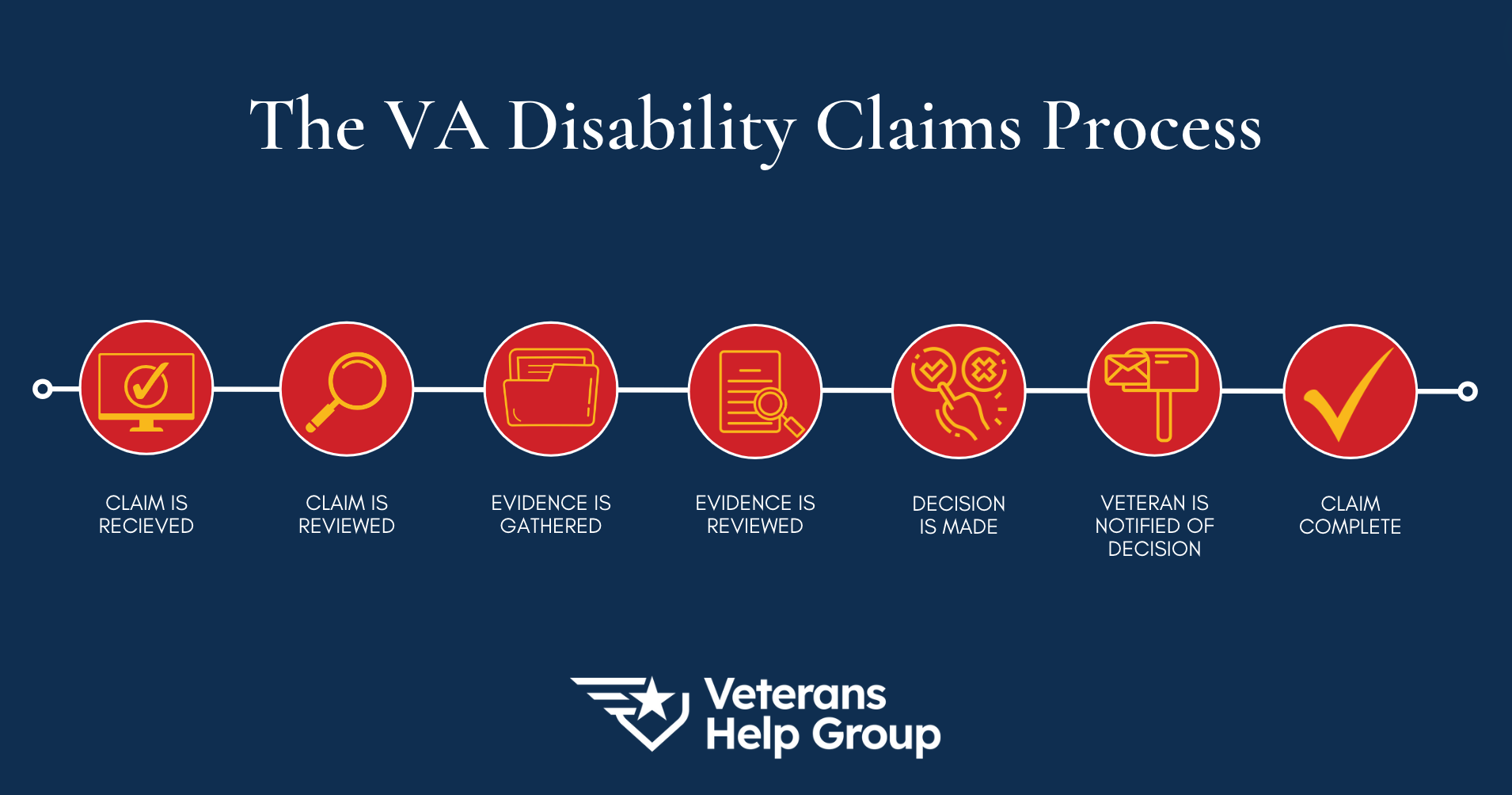
Table Of Contents
It’s one thing to know how to apply for VA disability compensation. It’s another to understand the complicated process that may follow that disability claim. Below we lay out the step-by-step process of what you can expect when you apply for veterans disability compensation.
What Happens After The VA Receives A Claim
After the VA receives your Application for Compensation, it sends you a letter. The letter explains what the VA needs to help grant your VA disability claim. It states how the VA assists in getting records to support your claim. The letter may include forms for you to complete, such as medical releases. They help the VA obtain pertinent medical records from your doctor or hospital.
You should try to complete and return all forms VA sends within a month. Your disability claim can often be processed more quickly if you send a copy of your medical records.
What Records Will The VA Obtain to Support My VA Disability Claim?
The VA will then attempt to get all the records relevant to your claimed disability or medical conditions from the military, private hospitals or doctors, or any other place you tell us. The person who decides your disability claim (called a Rating Veterans Service Representative) may order a medical examination. This examination is free of charge. You must report for your examination at the scheduled time to avoid delaying your claim.
What To Expect During Your Medical Examination
You should expect the examiner performing your medical examination to evaluate the condition(s) listed on your disability claim for benefits. Depending on the number and type of disabilities claimed, the length of the examination will vary. Psychiatric examination or that for multiple disabilities requires more time to evaluate.
The examiner may ask more questions about your disability’s history, review pertinent medical records, or order additional testing or examinations, if necessary. The examination will not include any form of treatment for disabilities or acute illnesses. Unless additional information, tests, or evaluations are needed, the completed evaluation will be documented and forwarded to the VA Regional Office for processing.
After Obtaining Your Records
After the Rating Veterans Service Representative has attempted to secure all the records (or evidence) required by law (including the report of any examinations), they review your file and make a decision on the claim according to the law and the particular facts in your case.
In the rating decision, the Rating Veterans Service Representative lists the evidence, the decision, and the reasons for it. The VA then sends the decision with a cover letter. If benefits are granted, the letter provides the monthly payment amount and the effective date. Payments usually begin soon after you receive the letter. However, if benefits are not granted and you think the decision was in error, or if you think the percentage evaluation or effective date is wrong, you may appeal.
The average time for an initial Rating Decision on a claim depends upon the nature of the claim and the evidence. However, most claims typically take approximately six to nine months for a decision to be made.
The VA Disability Compensation Appeal Process
Appealing The Initial Rating Decision to the Regional Office
Notice of Disagreement (NOD)
Veterans and other claimants for VA disability benefits have the right to appeal decisions made by a regional office. The claimant has one year from the date of the notification of a VA decision to file an appeal. The first step in the appeal process is for the claimant to file a written Notice of Disagreement (NOD) with the regional office that made the decision.
The Statement of the Case (SOC)
Following receipt of the NOD, the VA may offer the claimant another review of the claim by a Decision Review Officer (DRO). If the VA does not offer the claimant another review the VA will furnish the claimant a Statement of the Case (SOC) which is a decision in the appeal describing what facts, laws, and regulations were used in deciding the case and a discussion of any evidence submitted after the rating decision. Also, if additional evidence becomes available (from either the VA or the veteran) after the Statement of the Case has been issued, a Supplemental Statement of the Case is required. The most significant aspect of the Statement of the Case is that it triggers the tolling of time when a formal appeal by the veteran must be filed. A veteran has to file a formal appeal 60 days from the date on the cover letter to the SOC, or one year from the date of the original rating decision.
Right to a Hearing
The veteran has a right to a hearing before the hearing officer at which time new evidence may be submitted and must be considered.
Additional Evidence
A veteran may submit additional evidence for their VA disability claim that must be considered by the VA and a new adjudication must be made. However, the rating decision is final if the evidence is not received within one year of the initial decision. The veteran may still have his case re-opened if he has “new and material” evidence.
This entire process can take some time. Unfortunately, it can take up to a year or sometimes longer for the VA to issue a Statement of Case.
Substantive Appeal
To complete the appeal for your VA disability claim and move the case to the Board of Veterans Appeals (BVA), the claimant must file a Substantive Appeal by filing a VA Form 9 within 60 days of the mailing of the Statement of the case, or within one year from the date the VA mailed its decision, whichever period is later.
Board of Veterans Appeals (BVA)
The Board of Veterans Appeals makes decisions on appeals on behalf of the Secretary of Veterans Affairs. The claimant/appellant may present his/her case in person to a member of the Board at a hearing in Washington, DC, at a VA regional office or by videoconference. Board decisions are reported at www.va.gov/vbs/bva. This website also contains a plain language pamphlet, “Understanding the Appeal Process.” A copy of the pamphlet may also be obtained by requesting it in writing at Chief Bailiff (011), Board of Veterans Appeals, 810 Vermont Ave., N.W., Washington, DC 20420.
The Process
After the Regional Office receives a VA Form 9, it should certify the appeal and notify the BVA that there is an appeal so the BVA can docket the case. During the pendency of the appeal, the BVA will ask for any additional argument and may also order its own independent medical opinion (IME). If an IME is requested the veteran will be allowed to review and respond.
New Evidence
Unlike most appellate rules, the veteran appellant may submit additional evidence during the appeal. If new evidence is submitted the Regional Office must then issue a Supplemental Statement of the Case (SSOC), re-adjudicating the claim with the new evidence.
The Hearing
The veteran is entitled to a hearing if requested, which may be held at the RO, by videoconference, or at the BVA in Washington DC. The veteran can be represented by a veteran service officer, or advocates, or can appear alone. Witnesses can testify. Additional documents, including affidavits, may be submitted by the veteran. However, the BVA may only consider this additional evidence if the veteran waives the consideration by the Regional Office Otherwise the case must be returned to the Regional Office.
The Decision
BVA ultimately issues a Decision that is very similar to the Statement of the Case in that it references applicable laws and regulations, the evidence considered, and provides an explanation of the basis(es) of its decision. Its choices are to deny the claim, to remand the claim for further development, or to grant the claim either in whole or in part. If the BVA rules in favor of the veteran, the case has to be sent back to the RO for calculation and payment of benefits.
This process can also be timely, a BVA appeal can take as long as two and a half years.
Appeal
The veteran has 120 days from the date of the BVA decision to file an appeal on their disability claim.
U.S. Court of Appeals for Veterans Claims (CAVC)
A final Board of Veterans Appeals decision that does not grant a claimant the benefits desired may be appealed to the U.S. Court of Appeals for Veterans Claims (CAVC), an independent court in Washington, D.C. not part of the Department of Veterans Affairs.
Initiation of Appeal
The jurisdiction of the Court is invoked by the filing of the Notice of Appeal which should be accompanied by the $50 filing fee (this fee may be waived).
The Process
The Secretary of Veterans Affairs is the Appellee, represented by the Office of the General Counsel of the Department of Veterans Affairs, Group 7 (GCO). The GCO will prepare the Designation of the Record from the veterans file.
If the veteran disagrees with the Designation of the Record he has 30 days after its filing to identify the records that were or should have been before the BVA. This is referred to as the “Counter Designation of the Record.” The court hears disputes over the record designation and issues a ruling after which the GCO compiles the official record to be used by the Court and mails a copy to the veterans.
Briefing time limits are: 60 days for the appellant veteran from receipt of the Record; 60 days for the Appellee’s Response Brief from receipt of the Appellant’s Brief; and 14 days for the Appellant’s Reply Brief.
CAVC Decision
The CAVC may affirm, remand, or reverse the BVA decision.
Appeal from CAVC
Either party may appeal a decision of the court to the U.S. Court of Appeals for the Federal Circuit and may seek review in the Supreme Court of the United States.
We Are Here to Help You
If you have questions about your VA disability claim, we’re always here to help. Please don’t hesitate to call us at 855-855-8992 or contact us here now. We offer a free case evaluation and are happy to answer your questions.

Veterans Help Group Serving Our Community
Veterans Help Group Serving Our Community By Bobbi Boudi, Director of Community Outreach & Amy...

How Much Back Pay Will You Receive?
What is VA Disability Back Pay? VA disability back pay is payment for benefits the veteran was...

Your Guide to VA Ratings: Sleep Apnea
Your Guide to VA Ratings: Sleep Apnea Sleep apnea can be a serious condition that may impact...






